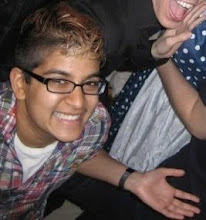Just posted Siwa Part Two below, and Siwa Part Three is coming soon, I swear. But until then, chew on this, and possibly another gender-related post to follow:
At times you can feel the novelty of being here slough off like dead skin after a sunburn. (...let me if that's not an accurate simile.) You get tired of people thinking you're fourteen. You get increasingly wary of gender-segregated spaces. You get more and more frustrated by your failure to comprehend Arabic and your inability to figure out the best way to direct a taxi driver from your apartment to school. You can feel your identities shifting and that's a weird thing and you're not sure if you're okay with it. And Cairo? Cairo is exhausting.
But then there are times like last night when none of that matters.
So our friend Mahmoud (an Egyptian who does theater and modern dance and is generally awesome) told us his friends were having a wedding party in the streets and that it would be cool and we should go with him. After a little bit of reluctance—in retrospect, I have no idea why that was—we agreed. The group of us, which now included a bunch of Americans on the program, Mahmoud, and a couple of members of the Egyptian handball team (who I guess we met at a party and started hanging out with...?), headed a metro stop over, walked across a bridge, and ended up at this awesome street party. Music, dancing, et cetera. It was super cool. Then we were invited upstairs and given apple juice, hung out, chatted, were generally happy.
A bit later, it was decided that the [two recognized] genders needed to split up, and the guys headed back downstairs. After some waffling I decided to stay upstairs.
I felt a little guilty about it at first. The only reason I was claiming this exclusively female gender identity was out of some personal/anthropological curiosity about what exactly would go down in the absence of a perceived male gaze. I'm sure stuff like this is a hard enough moral dilemma for actual anthropologists, who have a real goal of increasing cultural awareness and such. For me though, it was almost shamefully disingenuous: I was staying to satisfy nothing more than my own voyeuristic curiosity.
At the same time, it ended up being really easy and comfortable and accepting, surprisingly so. As soon as I was like, "I'm a girl," there was no awkward questioning, no skepticism, no disparagement or confusion on the part of the Egyptian women—just a quick oops sorry, and then things were totally cool. They were perfect and gracious and really fun. I mean asserting an identity like that in and of itself is a little weird and uncomfortable, because ... I dunno, I like letting people believe whatever they initially read me as. Chances are I am everything they believe me to be and more. But whatever, because after that initial step, it was a really really awesome night. And the cultural observer in me was more than intrigued.
The men left but the kids stayed regardless of gender, a cohort of little boys and girls running around, dancing, playing, being fun. The second my camera came out they would not leave it/me alone, constantly wanting pictures taken of every imaginable combination of people making every imaginable combination of facial expressions and body language. Their giddiness was contagious.
The women were dancing too, and the sense of community in the room was just so palpable. There was so much happiness and warmth and trust that you don't usually get to see. And of course there were plenty of other things you don't usually get to see. For example, hair. Hijabs were stripped off; niqabs were lifted and burqas were hitched up to reveal skinny jeans and heels, eye makeup and smiles and smiles. I realized that night that never when passing a woman in a niqab on the street had I envisioned a smile under her veil. Stupid of me. That has now changed.
Anyway, that party was just a really interesting social situation, and one I'm grateful I was allowed to participate in.
Of course, it leads to some serious pondering: Why is the presence of men so oppressive here, why does it prevent an atmosphere of trust and openness like this? How can an entire gender of people be othered like that, be constantly perceived as a threat? How can gender segregation make these women so comfortable and at ease, when for people from my background the same thing is kind of weird and uncomfortable, disconcertingly homogeneous in a way? Plenty of other questions emerge, of course, but those were the biggies I think. Anyway, yeah. Food for thought. And a good time. Perfect :)
Subscribe to:
Post Comments (Atom)

The wedding scene you describe of "women letting their hair down" is captured in the book "Kabul Beauty School" that you gave me!
ReplyDelete